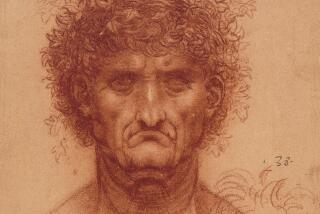Da Vinci, painted as a slacker of the Renaissance
- Share via
Leonardo da Vinci was a bastard -- in the original sense of the word. That seems to be the salient point of the new documentary “Da Vinci & the Code He Lived By” airing Sunday on the History Channel. That vulgar word is used to describe the artist’s out-of-wedlock birth no less than six times during the course of the two-hour program.
Bart Simpson might try to get away with repeating a vulgarity by using its dictionary definition, but it doesn’t fit here. The decision by producer-director Robert Gardner (“Islam: Empire of Faith”) to repeatedly describe Da Vinci in that manner is the first clue that the artist-scientist-engineer considered the prototype Renaissance man may not be getting the most favorable treatment here.
The story is told largely through dramatic reenactments of key events in and around Da Vinci’s life. Sam Mercurio’s narration strings the dramatizations together along with commentary from expert scholars and sophisticated animations.
Yet, whether by design or accident, the overall effect of this puzzling and often contradictory work is to diminish the esteem in which Da Vinci is held by many. It’s puzzling in that it offers only a partial and biased view of Da Vinci’s art and life. And it is contradictory in its portrayal of the genius who created the “Mona Lisa” and “The Last Supper” as both a brilliant artist and as an unreliable slacker: He was easily distracted; he flitted from project to project; he became bored with and never finished his greatest works. Da Vinci is shown as both an unqualified, self-promoting dilettante who pads his resume to get work as a military engineer and as a willing and effective collaborator in the bloody military conquests of Italian warlord Cesare Borgia.
As for the title, some viewers are certain to be disappointed when they discover that the only tie-in to Dan Brown’s bestselling novel “The Da Vinci Code” is the co-opting of its name to lure in fans of the book. Viewers will find no mention of the Holy Grail, the Priory of Sion or the Knights Templar. Even the Roman Catholic Church receives scant mention here, and Da Vinci’s personal religious beliefs are ignored. Instead, the term “the code he lived by” is derived from a vow the young Da Vinci apparently made to develop his artistic and intellectual talents and use them to rise above the circumstances of his birth, a personal code of conduct that drove him to the heights of artistic talent.
Perhaps a truer title for this production would have been “Da Vinci and the Violent World in Which He Lived,” for far less screen time is spent on his art than is devoted to dramatic re-creations of violence: graphic depictions of a hanging, numerous battle scenes, bloody assassinations, the slaughter of innocents caught up in war and a long, drawn-out execution by garrote. When the camera finally finds the “Mona Lisa” or “The Last Supper,” it doesn’t linger but continually pans and zooms, never offering the viewer a moment to appreciate the work as a whole or fully absorb the selected details.
The expert talking heads here do more than serve as a welcome respite from the violence of the dramatic reenactments. Their commentary and insights go a long way toward lifting the level of the documentary, with its annoying story summary and repetition of scenes after every commercial break. But it is telling that their expertise is weighted toward the history of Renaissance military, weaponry and politics, rather than the art of the period or Da Vinci himself.
At times Mercurio’s narration, with a heavy Italian accent, takes on a condescending tone that seems dismissive and contemptuous of the artist. The emphasis here is on the negative: Da Vinci’s unfinished work, his failures, his grand, yet impractical, designs. There’s also detailed mention of an accusation of sodomy made against Da Vinci, dismissed for lack of evidence, as well as allusions to relationships with young men.
It’s as if Brown’s novel somehow made the character and legacy of Leonardo da Vinci fair game. It would be a shame if this documentary served as any viewer’s first or defining view of Da Vinci.
*
Where: The History Channel
When: 9 p.m. Sunday
Ratings: TV-PG (may be unsuitable for young children)
Narrator...Sam Mercurio
Executive producers Carl H. Lindahl, Robert Gardner. Director Robert Gardner. Writer Steven Zorn.
More to Read
Only good movies
Get the Indie Focus newsletter, Mark Olsen's weekly guide to the world of cinema.
You may occasionally receive promotional content from the Los Angeles Times.











